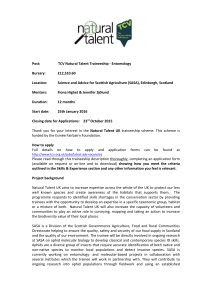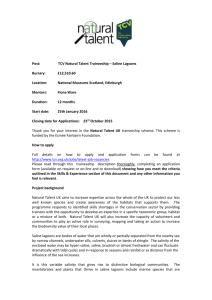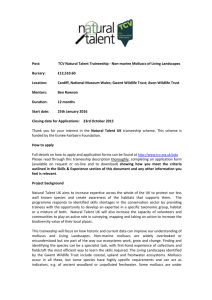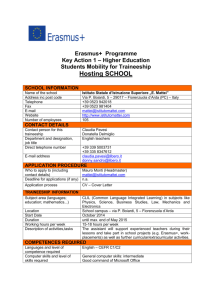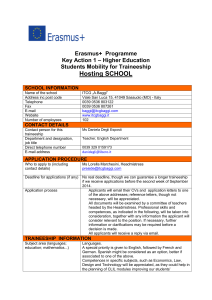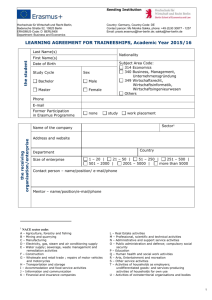Post: TCV Natural Talent Traineeship
advertisement
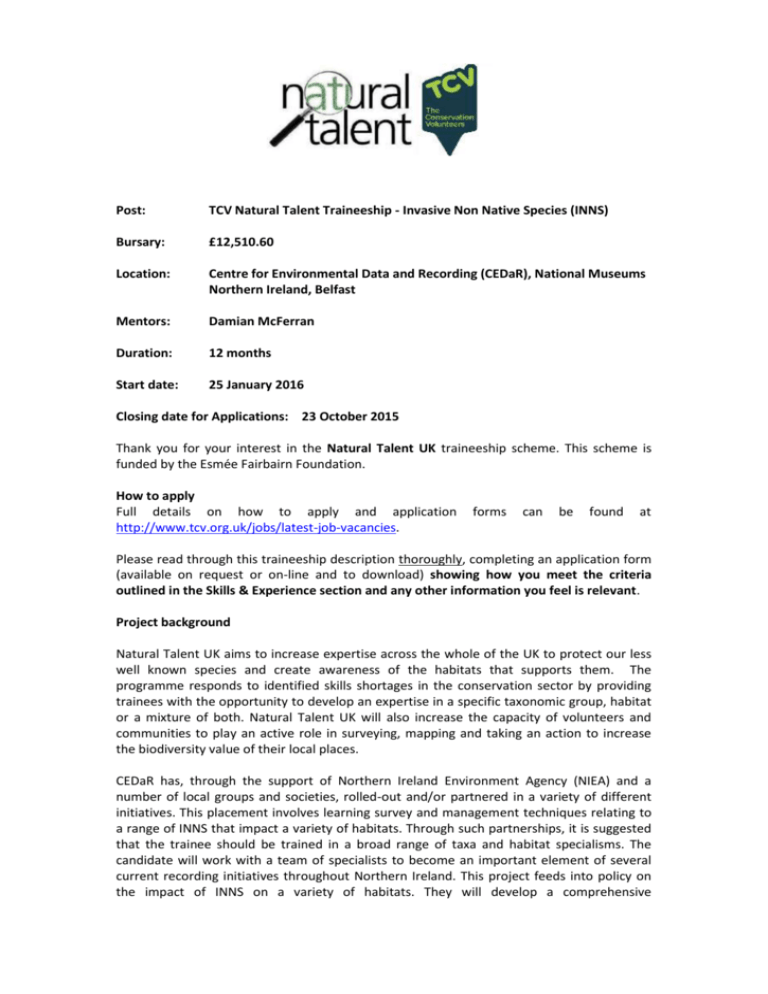
Post: TCV Natural Talent Traineeship - Invasive Non Native Species (INNS) Bursary: £12,510.60 Location: Centre for Environmental Data and Recording (CEDaR), National Museums Northern Ireland, Belfast Mentors: Damian McFerran Duration: 12 months Start date: 25 January 2016 Closing date for Applications: 23 October 2015 Thank you for your interest in the Natural Talent UK traineeship scheme. This scheme is funded by the Esmée Fairbairn Foundation. How to apply Full details on how to apply and application http://www.tcv.org.uk/jobs/latest-job-vacancies. forms can be found at Please read through this traineeship description thoroughly, completing an application form (available on request or on-line and to download) showing how you meet the criteria outlined in the Skills & Experience section and any other information you feel is relevant. Project background Natural Talent UK aims to increase expertise across the whole of the UK to protect our less well known species and create awareness of the habitats that supports them. The programme responds to identified skills shortages in the conservation sector by providing trainees with the opportunity to develop an expertise in a specific taxonomic group, habitat or a mixture of both. Natural Talent UK will also increase the capacity of volunteers and communities to play an active role in surveying, mapping and taking an action to increase the biodiversity value of their local places. CEDaR has, through the support of Northern Ireland Environment Agency (NIEA) and a number of local groups and societies, rolled-out and/or partnered in a variety of different initiatives. This placement involves learning survey and management techniques relating to a range of INNS that impact a variety of habitats. Through such partnerships, it is suggested that the trainee should be trained in a broad range of taxa and habitat specialisms. The candidate will work with a team of specialists to become an important element of several current recording initiatives throughout Northern Ireland. This project feeds into policy on the impact of INNS on a variety of habitats. They will develop a comprehensive understanding of key areas of study within this arena and the need for future work and its importance. The trainee will learn a variety of skills initially focusing on the published literature and current understanding of species impacts. However, there will be opportunities to widen this scope through our contacts with other individuals and groups/societies. The trainee will learn fieldwork techniques and surveying methods, including various species groups within a number of important habitats. The trainee will learn how to identify a number of taxonomic groups to species level by working in association with the local network of records and the various projects that are currently operational. They will go into the field with local experts and learn field craft. Opportunity to visit a variety of study sites will be encouraged and supported. The trainee will attend various training workshop as part of the 2016 CEDaR training programme. It is also anticipated that, within the allocated timescale, the successful applicant will have an opportunity to develop a bespoke project. Training During the traineeship, you will learn and apply the following skills: Species identification skills. Identification of INNS Learn how to manage data and records databases Field surveying and recording techniques Data analysis, report writing and IT skills in GIS Creation of management plans for the removal/control of INNS Community engagement techniques Delivering Citizen Science in communities Taxonomy and systematics Ecological surveying, analysis and monitoring Habitat restoration and management Monitoring and surveillance of the delivery of management plans. Practical experience of surveying and management techniques used to monitor effects of restoration techniques. Understanding of Biosecurity planning Landscape-scale approaches, recognising the importance of ecological networks and connectivity. Person specification ESSENTIAL DESIRABLE Qualifications: No formal qualifications necessary although candidates A passion and enthusiasm for protecting and will have to demonstrate knowledge of some aspect of conserving our natural environment the natural environment and their enthusiasm for the traineeship Experience: General field surveying techniques Some experience of working in practical conservation, particularly woodland environments Applicants will have some knowledge, background and understanding of INNS issues to understand what the traineeship will involve and thus deliver this traineeship to a high standard Skills : Applicants must have a good working knowledge of basic IT software packages (e.g. MS Office). Applicants must have excellent communication and interpersonal skills Applicants must be willing to undertake various tasks relevant to INNS management including project management, volunteer management, data processing, surveying and fieldwork. Personal Qualities: Applicants will have to demonstrate that they have the dedication and commitment to work on their own initiative to find external collaborators, network with other experts and complete the traineeship to a high standard. Be willing to undertake various tasks including outreach, data processing and fieldwork His role will require a level of fitness to allow the trainee to carry out any physical activity relating to the traineeship. Other: Although some natural history knowledge is preferable, motivation, enthusiasm, excellent communication skills and drive are the most important qualities in a potential applicant. The trainee will be expected to assist current and future planned activities that relate to the control and management of INNS. An understanding of current legislation across the UK A full, clean driving license The ability to work as part of a team player or as an individual, depending on the type of work carried out throughout the traineeship General field surveying Confidence in enthusing, encouraging and supporting communities to take part in education and Citizen Science activities

